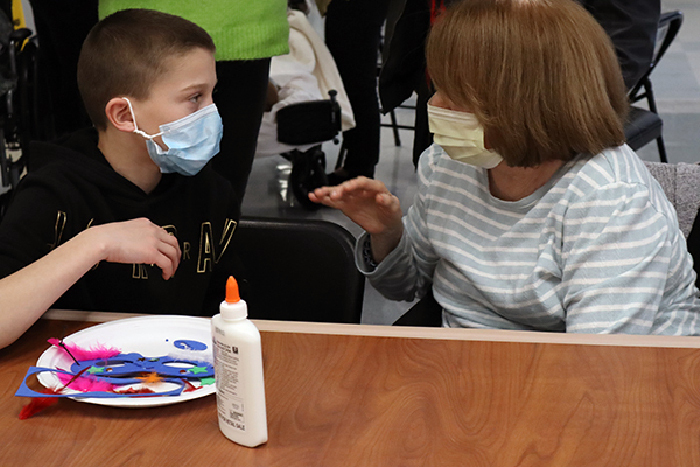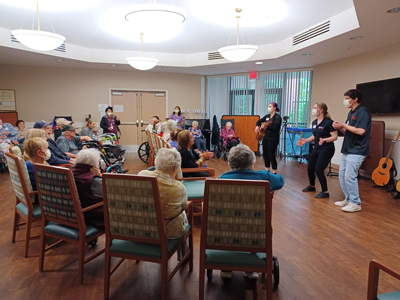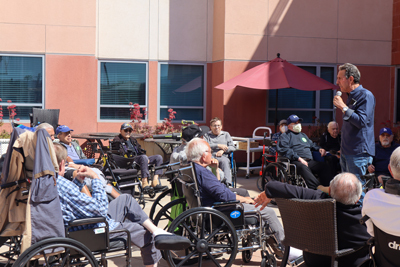From Generation to Generation at Los Angeles Jewish Health


From Generation to Generation at Los Angeles Jewish Health

As a leading national expert in the provision of senior care, Los Angeles Jewish Health has found a secret to graceful aging: youth. Through an expanded focus on intergenerational programming, the organization is bringing diverse groups of young people to its San Fernando Valley campuses to lift seniors' spirits and allow them to see the world through new eyes again.
It's all part of an ongoing focus at Los Angeles Jewish Health to identify innovative ways to enhance residents' lives. Commenting on the successful program, Chief Executive Officer and President Dale Surowitz says that "The goal is to inspire our seniors and to give them a reason to get excited about each day. I've seen first-hand how interactions with young people can light up our residents and fill them with enthusiasm. It is truly a wonderful thing to behold."
The benefit, Dale notes, is mutual. "Our residents get so much from being with younger folks—and the younger folks are also enriched in so many ways," he says. "Hearing about seniors' experiences, and sharing in their wisdom, adds meaning to their lives, as well."
Now that many of the pandemic health regulations have lifted, intergenerational in-person events are coming back to Los Angeles Jewish Health in a big way. "We're scheduling visits from youth groups, preschoolers, synagogues, primary schools, and more," says Stacy Orbach, the organization's director of volunteer services. "There's so much going on here; we've never had so many wonderful programs happening on both campuses at once!"

Examples of these intergenerational programs abound: In February, to celebrate Sweetheart's Day (Los Angeles Jewish Health's version of Valentine's Day), fifth graders and parents from Brentwood School stopped by to sing to residents and join them in arts and crafts projects. At Purim, preschoolers from a nearby Israeli gan (daycare) came to celebrate, arriving in costume and dancing for residents. Over Passover, a seventh-grade class from Temple Judea visited, chatting with residents and engaging them in activities. That same class returned a few weeks later, for Yom Ha'atzmaut (Israeli Independence Day), playing Israeli bingo with residents and continuing conversations they started during their first visit.
"I saw one of the residents hugging a boy from Temple Judea. When I asked her about it later, she said, ‘He remembered me from last time! It made me feel so good, I had to give him a hug.' Those are the moments we're trying to create, helping spark joy for our seniors that brightens up their days," says Julie Lockman-Gold, special programs coordinator.
Those moments are also powerful for visiting students. "We had an elementary
school class come from Heschel Day School. As the students were leaving, one of
them said to me, ‘Don't be surprised when you see me here volunteering when I'm
older, because I loved this!'" Stacy says.
Members of a music
club from Taft High School recently stopped by to perform swing and jazz numbers
for the residents. "One of our seniors was just dancing in her chair like crazy,"
Julie recalls. "She came up to the students afterward and told them, ‘I'm 98,
and I'm blind, but I can hear. Many years ago, I was a singer. Your songs are bringing
me back, and this is such a treat.' It was incredibly moving."

Not all visitors to Los Angeles Jewish Health are part of the under-18 set. The organization's own board chair, Andrew Berman, has launched a weekly program called the Men's Club—a discussion group that enables him to spend time with, and get to know, residents of the skilled nursing facility on Los Angeles Jewish Health's Grancell Village campus.
"We talk about a range of subjects, from food to politics to cars. Everyone gets to share their different perspectives, which is so healthy and energizing and therapeutic," Andy says. "It's also really gratifying for me because I learn so much from these guys. I'm just thrilled to be able to do it."
Building on our vision of enriching our residents each day, the staff at Los
Angeles Jewish Health is committed to ramping up intergenerational programming even
more in the near future. "We're doing everything we can to bring enrichment
to the lives of our residents," Stacy says. "This is one of the things
that differentiates us from every other facility in Los Angeles—we've taken
it to a higher level."
Reaching that "higher level" has
been made possible through gifts from donors and foundations such as the Steven
Ohren Foundation, which helps fund the music therapy program and certified therapy
dog program at Los Angeles Jewish Health. "People in our community recognize
the importance of intergenerational programming and want to contribute to it,"
says Corey Slavin, senior vice president of the Los Angeles Jewish Health Foundation. "We
are grateful for our donors' partnership—and, of course, additional support
is always welcome."